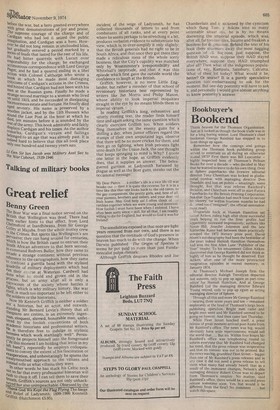Bookbuyer's
Bookend
Thank heaven for the Thomson Organisation. Just as it looked as though the book trade was inboring for a longwinter, Lord Thomson's chief bookman George Rainbird has stepped in to liven things up again. Remember how the comings and goings within the Thomson book publishing group served to entertain us all 'during an otherwise dismal 1973? First there was Bill Luscombe — highly respected boss of Thomson's Pelham Books for over a decade — who .decided in May that he wanted to leave to do his own thing. Over at Sphere paperbacks the livewire editorial director Tony Cheetham was locked in gladiatodal combat with managing director Don Teasdale, and lost on points — amazingly, some thought, but that was referee Rainbird's decision, and Cheetham went off to start Fut ura Paperbacks for the British Printing Corporation. Not that Don-leasdale had much time to savour his victory, for within fourteen months he had cl; arted too ("resigned", the official announcement read). Meanwhile back at Hamish Hamilton sat oillonAitken, riding high after three successful years helping to run the firm: profits had apparently increased impressively; authors like Susan Hill, Jennifer . Johnston and the late Katherine Raine had between them practically scooped the 1972 literary prize pool; David Niven's autobiography had been the bestseller of the year; indeed Hamish Hamilton themselves had won the first Allen Lane "Publisher of the Year" trophy. To his amazement Gillon Aitken discovered that George Rainbird did not think as highly of him as he thought he deserved. Exit Aitken, after one of the more protracted resignation episodes in recent memory, in January 1974. At Thomson's Michael Joseph firm the editorial director Raleigh Trevelyan departed last autumn, only to pop up again as part-time editor for Hamish Hamilton. And at George Rainbird Ltd the managing director Edward Young retired, only to pop up again as acting managing director of Sphere. Through all this and more Mr George Rainbird — — nearing three score years and ten remained implacably at the head of Thomson's large book publishing operation. Bright men came and bright men went and Mr Rainbird seemed to be going onforever. And then came last Thursday. While Fleet Street lunched itself, a press release of great moment arrived post-haste from Mr Rainbird's office. The news was big, would obviously have wide repercussions, would tell the world that . But no. Within four hours Mr Rainbird's office was telephoning round to inform everyone that Mr Rainbird had changed his mind, that the press release was inoperative and that its content was not to be printed. But the news was big, grumbled Fleet Street — bigger than one of Mr Rainbird's press releases and in any case it did not need a press release to tell them what many had already heard: that as a result of the imminent changes, Nelson's able managing director Robert Cross was to depart from Thomson's employ. No matter, said Rainbird's office, there would be a second press release sometime soon. Yes, but would it be
watch this space. „ different from the first? No comment but


































 Previous page
Previous page